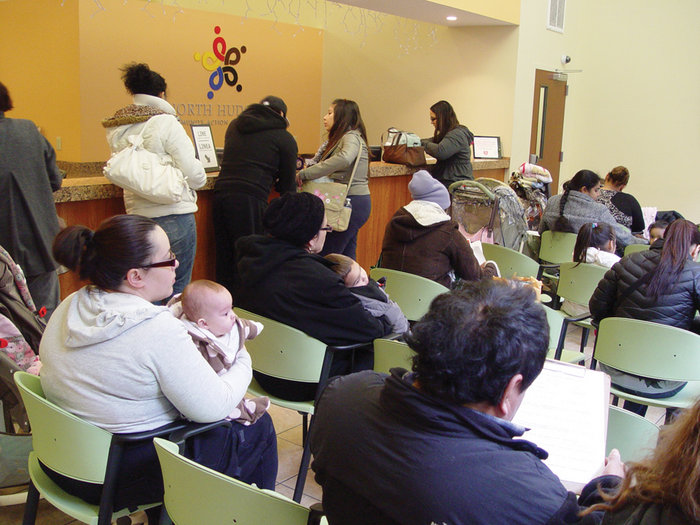The North Hudson Community Action Center’s relatively new Women, Infant and Children’s Center was bustling on a Thursday morning with children who played with toys placed around the waiting room or watched “Cinderella” on a big-screen TV.
NHCAC is a local health agency that provides services for low-income residents, including a branch of the U.S. government’s WIC program for needy moms and children. WIC is funded by the Food And Nutrition Service of the U.S. Department of Agriculture. It provides pregnant and postpartum women and their children (up to age 5) with nutrition education classes, monthly food vouchers, breastfeeding support, and individual and group counseling.
They see approximately 200 women per day.
____________
The importance of early childhood nutrition
WIC Coordinator Karen Lazarowitz said a main benefit is that more women in the area are being encouraged to breastfeed their children.
“It helps protect the gastrointestinal tract, it strengthens the immune system and helps to prevent ear infections and other childhood illnesses, and some studies say it may even help prevent heart disease, cancer, and obesity later in life,” she said.
According to Lazarowitz, formula was promoted in the 1970s as a more nutritious alternative to breastmilk – a finding that has been overturned through more advanced, recent research. Working mothers and mothers on the go have sometimes had to rely on formula, but the best case scenario, Lazarowitz said, is for infants to be 100 percent breastfed. This is WIC’s goal.
Eighty-five percent of WIC participants breastfeed, which is a great improvement on the 59 percent state average, she said. WIC staffers recommend breastfeeding for at least one year, but to meet the more realistic needs of their participants, they offer lessons on how to properly use a breast pump. They also suggest introducing infants to “sippy” cups (vs. bottles) at seven months to aid with the transition.
Proper nutrition is crucial for pregnant and current mothers themselves, so WIC offers a series of monthly food voucher plans that help them meet varying degrees of increased nutritional need: There are separate plans for prenatal mothers and for full, partial, and non-breastfeeding postpartum mothers.
New center, new successes
The new facility, which has 32 employees (including nine nutrition and six breastfeeding counselors, all certified and with their own office space), offers participants “higher quality service in a shorter amount of time,” Lazarowitz explained.
“We see around 200 participants a day,” she said. “Thanks to the new center, they can get an appointment in around two days, whereas before it took at least a week or two.”
Participants have access to a spacious, darkened breastfeeding lounge where both pregnant and postpartum women can take advantage of a relaxing and supportive atmosphere to breastfeed and compare notes on child-rearing.
Director of NHCAC Rosemary Lavagnino is proud of what she termed the “bipartisan efforts” required to make the center what it is today.
“We are here for our residents,” she said, “but we are also responsible to the taxpayers who provide the dollars, and to our state and federal legislators who secure our funding.”
Last year WIC received a $1.5 million state allocation from federal funding, and with this, she said, they have provided $5.8 million in service; which translates to a 400 percent return on the taxpayer dollar.
The WIC program is unique because its related 10 federally qualified health centers under the NHCAC umbrella group allow participants to receive instantaneous referrals for proper medical and dental treatment.
“I am very passionate about this,” Lavagnino said. “We exist to start our clients in the right direction, and we promote ideas which lead to sustain self-sufficiency.”
Community outreach
Before becoming a participant, each mother meets with an intake specialist to determine their eligibility. They must live in state, have a household income of up to 185 percent above the national poverty guidelines, and either be pregnant, postpartum, or have an infant or child under age 5.
WIC reaches around 84 percent of the women in the area who are eligible. Their goal is to reach the remaining 16 percent.
“We welcome all qualified Hudson County residents to apply,” Lazarowitz said, “and we wish to assure potential participants that their confidentiality will be fully honored.” She recommends that applicants call before showing up at the center.
Union City’s WIC Center is located at 47 39th St., and may be reached at (201) 866-4700.
Gennarose Pope may be reached at gpope@hudsonreporter.com
